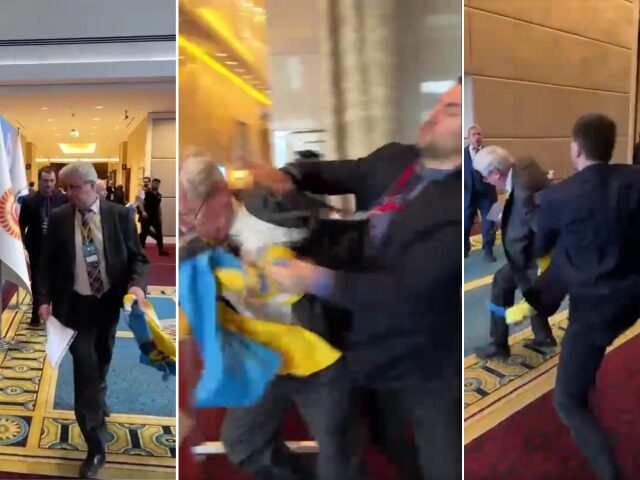Multiple physical altercations occurred on Thursday between Russian and Ukrainian representatives at the Organisation of the Black Sea Economic Cooperation (BSEC) assembly in Turkey, including one in which a Ukrainian delegate punched his Russian counterpart in the face.
The latter incident occurred after Ukrainian representative Oleksandr Marikovski unfurled a Ukrainian flag behind a Russian delegate filming a video in a hallway at the meeting’s venue, an Ankara hotel. Russian delegation secretary Valery Stavitsky seized the flag mid-photo to prevent it from appearing in his colleague’s video and appeared to run away; Marikovski chased him and punched him repeatedly in the face, knocking off the Russian’s glasses.
Marikovski published a video of the incident on his Facebook page with the caption, “paws off our flag, paws off Ukraine, Russian bastard!”
Лапи геть від нашого прапора, лапи геть від України, російська паскуда! PABSEC
Posted by Oleksandr Marikovski on Thursday, May 4, 2023
Event organizers reportedly took Stavitsky to a local hospital for a check-up, but reports do not indicate he suffered any serious injuries.
In a separate but similar incident that day, Ukrainian delegates attempted to interrupt remarks by Olga Timofeeva, the Russian representative Marikovski waved a Ukrainian flag behind, by standing up behind her and waving multiple flags, resulting in an altercation and Turkish Parliament Speaker Mustafa Şentop, who was presiding over the assembly, asking security to expel the Ukrainians.
Şentop issued a public apology for the incident.
A scuffle broke out between Ukrainian and Russian delegates at a meeting of the Parliamentary Assembly of the Black Sea Economic Cooperation (PABSEC) in Türkiye’s capital Ankara
Tensions boiled over after Ukrainians interrupted a Russian official’s speech👇 pic.twitter.com/AzZiQi2B6L
— ANADOLU AGENCY (@anadoluagency) May 4, 2023
Rus-Ukrayna heyetleri arasında gerginlik
Karadeniz Ekonomik İş Birliği Parlamenter Asamblesi (KEİPA) 30. Yıl Dönümü Parlamento Başkanları Zirvesi’nde, Rusya Delegasyonu Başkan Vekili Olga Timofeeva'nın konuşması sırasında Ukrayna heyetinin bayraklı protesto yaptı.
Ankara'da… pic.twitter.com/UsXOBuodwo
— Halkın Portalı (@HalkinPortali) May 4, 2023
The Ankara assembly was a meeting of the parliamentary assembly of the Organisation of the Black Sea Economic Cooperation, a sub-organization known as PABSEC that describes its objective as to “provide a legal basis for economic, commercial, social, cultural and political cooperation among the member countries.” Most of its members are Balkan states and others along the Black Sea coastline; it is one of the few organizations in which Ukraine and Russia both remain full members.
The Ukrainian representatives at the assembly are members of Ukraine’s parliament, the Verkhovna Rada, where physical fights have broken out on several occasions in the past decade. The largest recent brawls at the lawmaking body occurred in 2014 and 2018, both triggered by debates over Russia’s nearly decade-long attempts to colonize parts of Ukraine.
Parliament brawls in Kyiv are so common that the Verkhovna Rada is depicted as being in a constant melee on the program Servant of the People, starring current Ukrainian President Volodymyr Zelensky as a fictional president prior to the launch of his political career. In a running gag, the fictional president Zelensky portrayed in the show only manages to stop the brawls by falsely yelling that Vladimir Putin has died or been overthrown in a coup.
The Ukrainian state outlet Ukrinform has abstained from commenting on the incident on its English-language website at press time. The Russian government and its affiliated media, however, have given the incident significant airtime. The Russian news agency Tass noted on Friday that Russia’s delegation had levied complaints to the Turks for not providing sufficient security to prevent the conflicts.
“The Russian ambassador has discussed the incident involving Russia’s delegation with the Turkish parliamentary speaker. The event’s organizers should have ensured proper security and there is a very big question addressed to them as to how this could have happened,” Timofeeva said on Friday. “I know that the police were there and questioned the eyewitnesses who saw the fight. In reality, no one has the right to simply look the other way regarding any provocation.”
“We will remain here to do our work on this platform,” the official promised. “We believe that it’s important to express our opinion and we will keep trying in every possible way to call for constructive behavior. We would like this free-for-all and provocations to become a thing of the past.”
Turkey is a NATO member country but maintains warm ties with Russia, often to the chagrin of fellow NATO members. Despite this, Ankara’s recent history with Russia includes significant episodes of violence, including the Turkish government shooting down a Russian aircraft near Syria in 2015 and the assassination of Russian ambassador to Ankara Andrei Karlov a year later. Turkish authorities blamed the assassination on a supporter of cleric Fethullah Gülen, Islamist Turkish President Recep Tayyip Erdogan’s biggest political foe.
Russia’s top diplomat, Foreign Minister Sergey Lavrov, used the occasion to disparage Ukraine generally.
“(Ukrainian President Volodymyr) Zelenskyy and his team are doing everything both in the media space and in their practical steps so that any self-respecting country does not want to communicate with them,” Lavrov said in a statement. “This is indeed the case, and we understand that awareness of this is maturing.”
The incidents on Thursday followed a series of explosions at Russian facilities this week — and the appearance of a drone over Moscow that the Kremlin claimed the Ukrainians sent into the country to assassinate Putin. The Russian government claimed it had shot down two drones over the Kremlin itself, blaming Kyiv and the United States for an alleged plot to kill Putin. The Ukrainian government denied involvement in the incident, claiming that anti-Putin Russian insurgents had most likely plotted the attack.
Neither the governments of Russia nor Ukraine have presented any material evidence to support their theories.

COMMENTS
Please let us know if you're having issues with commenting.